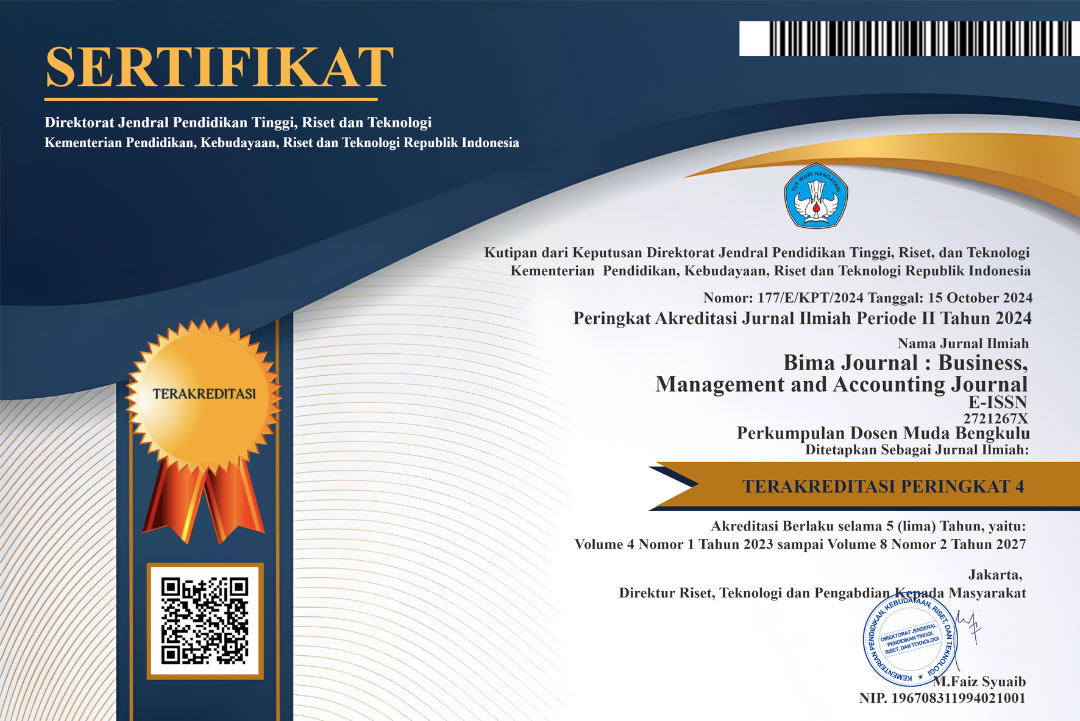Analysis of the Muzakki Confidence Index in Paying Zakat in Baitul Mal Regency (BMK) Southeast Aceh
DOI:
https://doi.org/10.37638/bima.5.2.167-174Keywords:
Keyakinan Muzakki, Baitul Mal, Zakat.Abstract
Purpose: This study aims to analyze the factors influencing Muzakki's trust in Baitul Mal in Southeast Aceh Regency and identify strategies to enhance trust in zakat payment. Methodology: The research employs a mixed-method approach, combining qualitative and quantitative methods. Primary data was collected, and multiple linear regression analysis was performed using SPSS 26 to evaluate the findings. Results: The study reveals that the Muzakki Confidence Index in Baitul Mal, Southeast Aceh Regency, is 0.88 or 88%, categorized as High Confidence. Despite corruption cases in 2021, trust remains high due to effective management strategies. Findings: The strategies identified to grow Muzakki’s trust include professionalism, transparency, accountability, and credibility in zakat management. Originality: This research highlights the importance of institutional trust in fostering zakat payment in Southeast Aceh and provides actionable strategies for improvement. Novelty: The study integrates trust-building strategies into zakat management and highlights the impact of professionalism and ethical governance.Conclusions: Effective management strategies are essential to maintaining Muzakki’s trust, ensuring optimal zakat collection and distribution. Type of Paper: Empirical research Paper.
References
Abdullah, S. (2003). Zakat Profesi. Mogo Segoro Agung.
Adlini, M. N., Dinda, A. H., Yulinda, S., Chotimah, O., & Merliyana, S. J. (2022). Metode penelitian kualitatif studi pustaka. Edumaspul: Jurnal Pendidikan, 6(1), 974–980.
https://doi.org/10.33487/edumaspul.v6i1.3394
Al-Amin, A., Andespa, W., & Bashir, H. (2022). Peran Baitul Maal Wa Tamwil (BMT) Sidogiri Unit Cabang Sui Kunyit terhadap pemberdayaan usaha mikro kecil di Desa Sui Kunyit Hulu. Bullet: Jurnal Multidisiplin Ilmu, 1(6), 1214–1227.
Al-Amin, A.-A., Alfia, N., Subeno, H., Andespa, W., & Sabri, S. (2023). The effect of claim service quality on the decision to buy sharia insurance products (Case study on sharia insurance in Indonesia). GIC Proceeding, 1, 396–407.
Al-Amin, A.-A., & Andespa, W. (2022). Income and cost analysis of profitability in the Baitul Maal Wa Tamwil Sidogiri savings and loans cooperative, Mempawah branch. Jovishe: Journal of Visionary Sharia Economy, 1(1), 75–87.
Amin, A.-A., & Taufiq, M. M. (2023). Analisis pengaruh hifdz al maal terhadap pengelolaan harta pada pedagang Muslim Pasar Aur Kuning Kota Bukittinggi. JESI (Jurnal Ekonomi Syariah Indonesia, 12(2), 163–169.
Amin, A., Putra, R., Subeno, H., Bashir, H., Andespa, W., & Ridwan, A. (2023). Penerapan dan urgensi model cash waqaf (Studi pada hasil jurnal penelitian di Indonesia). Journal on Education, 5(2), 3095–3107.
Asbullah, M., Barus, I., Al-Amin, A.-A., & Irnayenti, I. (2023). Pengaruh pelatihan budidaya lele terhadap minat berwirausaha masyarakat Sui Kunyit Hulu. Jurnal Ilmiah MEA (Manajemen, Ekonomi, & Akuntansi, 7(1), 923–932.
Assa, H., & Pramono, S. (2019). Kenapa Muzakki percaya kepada lembaga? Jurnal Akuntansi dan Keuangan Islam, 7(April), 81–100.
Bustamam-Ahmad, K. (2007). The application of Islamic law in Indonesia: The case study of Aceh. Journal of Indonesian Islam, 1(1), 135–180. https://doi.org/10.15642/JIIS.2007.1.1.135-180
Darmayanti, Suharto, R. B., & Susilo, J. (2023). Peran Unit Pengumpul Zakat terhadap kepatuhan membayar zakat profesi pada Unit Pengumpul Zakat Universitas Mulawarman. JESM: Jurnal Ekonomi Syariah Mulawarman, 2(2), 75–84.
Dewi, R. C., & Suparno, S. (2022). Mewujudkan good governance melalui pelayanan publik. Jurnal Media Administrasi, 7(1), 78–90.
Febrianti, E., Sabri, S., Asnah, A., & Al-Amin, A.-A. (2023). Komparasi pengelolaan pendapatan negara dari sektor zakat di masing-masing periode Kalifah Ar Rasyidin. Innovative: Journal of Social Science Research, 3(2), 11021–11032.
Hawari, R., Ismail, A. Y., Febriani, E., Amin, A., & others. (2023). Performance measurement based on sharia maqashid at Al-Anshari Bukittinggi Sharia savings and loans cooperative and sharia financing. ICEFS Proceeding, 1, 18–26.
Hermawan, S., & Hariyanto, W. (n.d.). Buku ajar metode penelitian bisnis (Kuantitatif dan Kualitatif).
Hooker, M. (2003). Islam Mazhab Indonesia: Fatwa-fatwa dan perubahan sosial (Ilham B. Saenong, Ed.; Iding Rosyidin Hasan, Trans.). Mizan.
Minhaji, A. (1998). Islamic law under the Ottoman Empire. Titian Ilahi Press.
Riyaldi, M. H., & Yusra, M. (2020). Mengukur tingkat kepercayaan Muzakki kepada Baitul Mal Aceh. Iqtishaduna: Jurnal Ekonomi Islam, 6(1), 78–90. https://doi.org/10.24252/iqtisaduna.v6i1.14072
Safinal. (2021). Implementasi zakat core principles dalam pendistribusian zakat di Baitul Mal Kota Banda Aceh. Al-Infaq: Jurnal Ekonomi Islam, 12(1).
Sahroni, A. H. (2018). Transparansi pengelolaan dalam kecenderungan pilihan berzakat ke lembaga pengelola zakat. Jurnal Ekonomi Syariah, 5(7), 97–111.
Sugiyono. (2009). Metode penelitian kuantitatif, kualitatif dan R&D. Alfabeta.
Yusra, M. (2020). Faktor-faktor penentu kepercayaan Muzakki kepada Baitul Mal Aceh. Jurnal Iqtishaduna, 16(1), 1–16.
Zahara, H. S., Zahra, M., Prawita, A., & Zahra, S. (2023). Akuntabilitas dan transparansi lembaga pengelola zakat melalui zakat core principles dan PSAK 109. Jurnal Mutiara Ilmu Akuntansi (JUMIA), 1(3).
Downloads
Additional Files
Published
Issue
Section
License
An author who publishes in the BIMA JOURNAL: Business, Management, and Accounting Journal agrees to the following terms:
Author retains the copyright and grants the journal the right of first publication of the work simultaneously licensed under the Creative Commons Attribution-ShareAlike 4.0 License that allows others to share the work with an acknowledgement of the work's authorship and initial publication in this journal
Submission of a manuscript implies that the submitted work has not been published before (except as part of a thesis or report, or abstract); that it is not under consideration for publication elsewhere; that its publication has been approved by all co-authors. If and when the manuscript is accepted for publication, the author(s) still hold the copyright and retain publishing rights without restrictions. For the new invention, authors are suggested to manage its patent before published. The license type is CC-BY-SA 4.0.
BIMA JOURNAL: Business, Management and Accounting is licensed under a Creative Commons Attribution-ShareAlike 4.0 International License.
You are free to:
Share — copy and redistribute the material in any medium or format
Adapt — remix, transform, and build upon the material
for any purpose, even commercially.
The licensor cannot revoke these freedoms as long as you follow the license terms.
Under the following terms:
Attribution — You must give appropriate credit, provide a link to the license, and indicate if changes were made. You may do so in any reasonable manner, but not in any way that suggests the licensor endorses you or your use.
ShareAlike — If you remix, transform, or build upon the material, you must distribute your contributions under the same license as the original.
- No additional restrictions — You may not apply legal terms or technological measures that legally restrict others from doing anything the license permits.
Notices:
- You do not have to comply with the license for elements of the material in the public domain or where your use is permitted by an applicable exception or limitation.
- No warranties are given. The license may not give you all of the permissions necessary for your intended use. For example, other rights such as publicity, privacy, or moral rights may limit how you use the material.





















